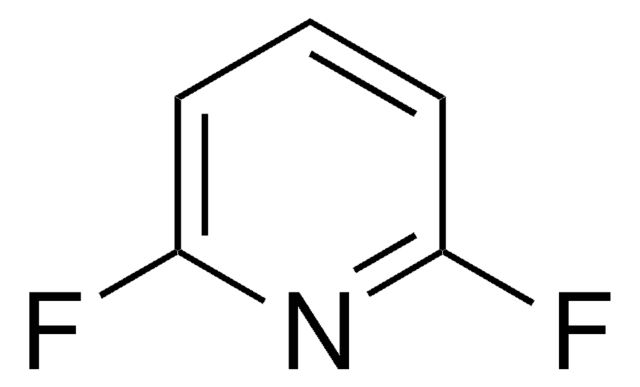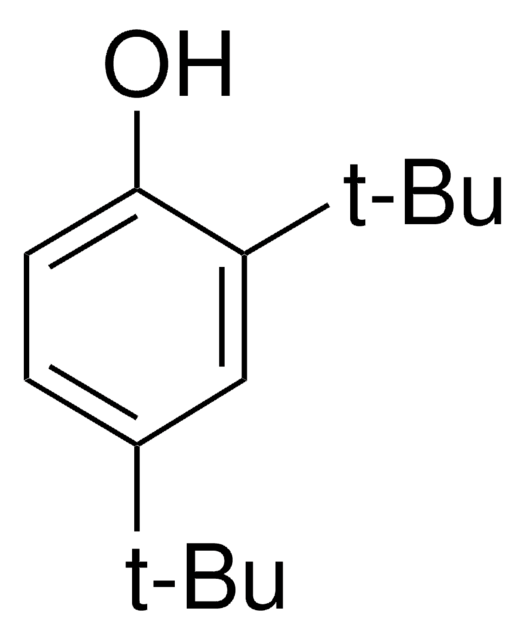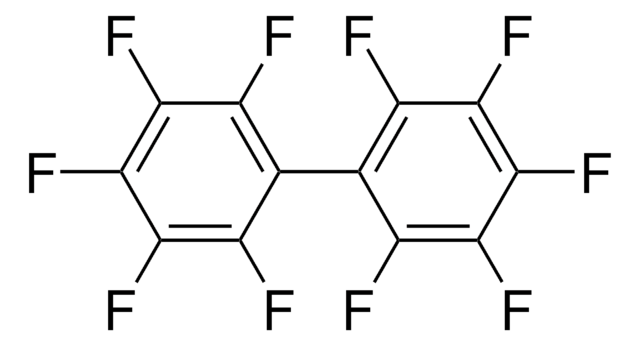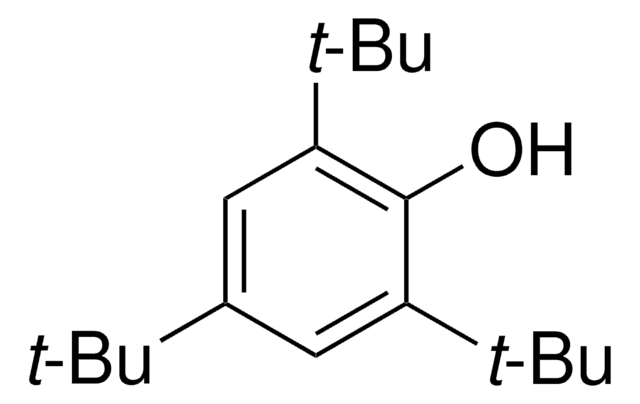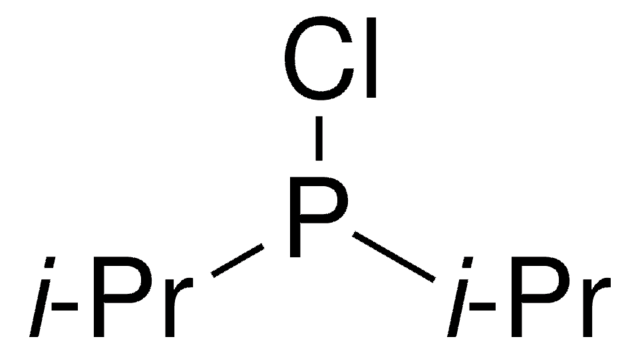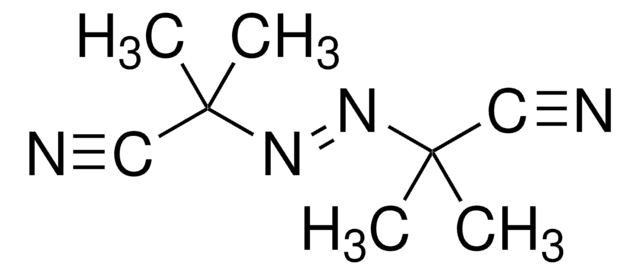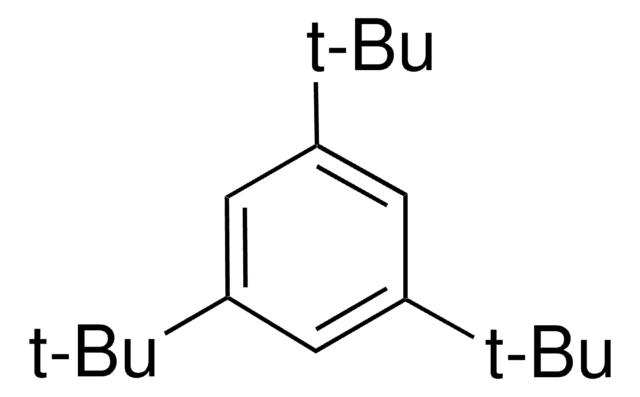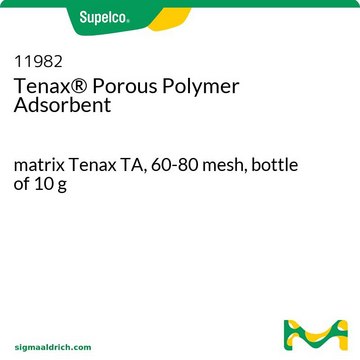233595
2,6-Diphenylphenol
98%
Iniciar sesiónpara Ver la Fijación de precios por contrato y de la organización
About This Item
Fórmula lineal:
(C6H5)2C6H3OH
Número de CAS:
Peso molecular:
246.30
Número CE:
Número MDL:
Código UNSPSC:
12352100
ID de la sustancia en PubChem:
NACRES:
NA.22
Productos recomendados
Nivel de calidad
Ensayo
98%
Formulario
solid
mp
101-103 °C (lit.)
grupo funcional
phenyl
cadena SMILES
Oc1c(cccc1-c2ccccc2)-c3ccccc3
InChI
1S/C18H14O/c19-18-16(14-8-3-1-4-9-14)12-7-13-17(18)15-10-5-2-6-11-15/h1-13,19H
Clave InChI
ATGFTMUSEPZNJD-UHFFFAOYSA-N
¿Está buscando productos similares? Visita Guía de comparación de productos
Descripción general
2,6-Diphenylphenol reacts with with (n)BuLi, NaH, KH, or Rb or Cs metal in benzene to yield the solvent-free complexes [M(OAr)]x.
Aplicación
2,6-Diphenylphenol has been used:
- as ligand during the synthesis of reduced coordination (less than 6), unchelated manganese oxygen cluster systems
- in the preparation of derivatives of pyrazine-2,3-dicarbonitrile, precursor required for the synthesis of octaazaphthalocyanine (AzaPc) derivatives
Palabra de señalización
Warning
Frases de peligro
Consejos de prudencia
Clasificaciones de peligro
Aquatic Acute 1 - Aquatic Chronic 1
Código de clase de almacenamiento
11 - Combustible Solids
Clase de riesgo para el agua (WGK)
WGK 3
Punto de inflamabilidad (°F)
Not applicable
Punto de inflamabilidad (°C)
Not applicable
Equipo de protección personal
dust mask type N95 (US), Eyeshields, Gloves
Elija entre una de las versiones más recientes:
¿Ya tiene este producto?
Encuentre la documentación para los productos que ha comprado recientemente en la Biblioteca de documentos.
Los clientes también vieron
Saad Makhseed et al.
Chemistry (Weinheim an der Bergstrasse, Germany), 14(16), 4810-4815 (2008-05-01)
The synthesis of octaazaphthalocyanine (AzaPc) derivatives, with bulky phenoxyl substituents placed at eight peripheral positions and containing either H(+), Ni(2+) or Zn(2+) ions in their central cavity, is described. The required precursors, derivatives of pyrazine-2,3-dicarbonitrile, were prepared using a nucleophilic
Charles S Weinert et al.
Inorganic chemistry, 42(19), 6089-6094 (2003-09-16)
Reaction of 2,6-diphenylphenol (HOC(6)H(3)Ph(2)-2,6) with (n)BuLi, NaH, KH, or Rb or Cs metal in benzene gives the solvent-free complexes [M(OAr)]x in excellent yield. The complex [Rb(OC(6)H(3)Ph(2)-2,6)](x)() exhibits a ladderlike structure in the solid state with triply bridging oxygen atoms and
Sandeep K Kondaveeti et al.
Inorganic chemistry, 51(19), 10095-10104 (2012-09-06)
The synthesis of reduced coordination (less than 6), unchelated manganese oxygen cluster systems is described. Addition of phenols to Mn(NR(2))(2) (R = SiMe(3)) results in protolytic amide ligand replacement, and represents the primary entry into the described chemistry. Addition of
Camilo J Viasus et al.
Chemistry (Weinheim an der Bergstrasse, Germany), 23(68), 17269-17278 (2017-10-17)
The reactivity of carbon dioxide with vanadium(III) aryloxo complexes has been investigated. The formation of either carbon monoxide or incorporation into the ligand system with the ultimate formation of organic ester was observed depending on the overall electron donor ability
Ursula J Williams et al.
Dalton transactions (Cambridge, England : 2003), 43(43), 16197-16206 (2014-08-26)
The trivalent compound K[Ce[N(SiHMe2)2]4] was synthesized and oxidized, providing a convenient route to the reported cerium(IV) compound Ce[N(SiHMe2)2]4. Protonolysis reactions of Ce[N(SiHMe2)2]4 with tert-butanol, substituted benzyl alcohols, and 2,6-diphenylphenol yielded the neutral tetravalent compounds Ce(O(t)Bu)4(py)2, Ce2(OCH2C6R5)8(thf)2 (R = Me, F)
Nuestro equipo de científicos tiene experiencia en todas las áreas de investigación: Ciencias de la vida, Ciencia de los materiales, Síntesis química, Cromatografía, Analítica y muchas otras.
Póngase en contacto con el Servicio técnico